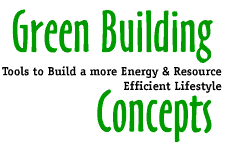 |
 |
 |
| |
 |
 |
 |
 |

Welcome to the Green Building Concepts Newsletter, a periodic electronic newsletter.
Subscription
Subscribe to this newsletter via the Web at (www.greenconcepts.com).
In the future if you would like to be removed from the Green Building Concepts
Newsletter send an e-mail to subscribe@greenconcepts.com with the subject
containing the words, "remove from service."
Index
Products, Technology, Programs, and Key Announcements
- Green Architecture Resources Abound in Print and Web
- The Making of Media- QuicktimeVR Tools
- Selecting Plastic Sheeting
- Super Efficient HVACR System
Green Architecture Resources
Abound in Print and Web
There are thousands of resources on the internet on green building. Some fine
catalogs of the sites can be found at:
- The
School of Architecture, State University of New York at Buffalo
- The Lawrence Berkeley National Laboratory
In the print media several journals present sound construction advice.
This Old House
Not a 100% energy efficient guide, but its articles do provide sufficient
information on new appliance trends, do-it-yourself projects, and helpful
tips. [Editor's Note: as requested by This Old House Ventures, both todayshomeowner.com
and thisoldhouse.org have been retired. The above link reflects the current
site redirect.]
Home Energy Magazine
The industry standard tome for the energy efficient expert. It covers single
and multi-family housing. The journal comes out bimonthly for your mind's
pleasure.
E-Magazine
A broad topic magazine for the environmental community. Periodically it provides
homeowner style articles.
The Making Of Media - QuicktimeVR Tools
In the past I've wanted to produce web based virtual reality (VR) photography,
but file size and tool selection had been a hindrance. As QuickTime VR reaches
version 2.0.1 for MacOS, toolmakers have made two products to take the many
images shot for panorama and stitch them into a single scene. Nodester ($169)
from Panimation uses a work-flow process from selecting the photographs and
camera lens combination, automatically producing the stitching, allowing final
user modifications, and ending with the final photographic plate. [Editor's
Note: Panimation was aquired by VRToolBox]
Using an off-the-shelf tripod and rented 15 mm super-wide-angle lens I attempted using the 1.0 version of the software. My scenes involved unforgiving (no special tripod head or leveling platform) close quarter environments (a small home). At the final step of the work process, you have the option to choose several codec's for the image and set maximum and minimum magnifications along with starting parameters. I have not used the Apple Computer QuickTime VR developer's kit that allows linking multiple VR images as a walk-around combination of scenes, but every image from Nodester worked superbly, with little input from my part. All I had to do was supply the digital photographs (I used PhotoCD), and the program did the rest of the manipulation. You can see the results at my web home at greenconcepts.com.
Another tool from Live Picture may become a standard on the internet. Live Picture's RealVR defines VR Photography with VRML, allowing faster loading, viewing and manipulation than the QuickTime VR model. The product called PhotoVista ($99) uses a similar workflow as Nodester, but only allows you to save the final image in a limited number of compression formats. If you need small VR files, PhotoVista minimized file size with equal stitching quality as Nodester. One needs to install the RealVR plug-in to view your photos and the product does not allow authoring of clickable hot spots like Nodester. With the easy to use tools anyone can make walkaround photographs for under $200.
Selecting Plastic Sheeting
The popular plastic sheeting found in home centers has multiple uses from
vapor barriers, outdoor covers, ground covers, and shade. The product comes
in several thickness and colors. For indoor applications a clear or black
1 mil thickness sheet works fine for use in protecting floors from paint splatter
or other immediate needs. 4 mil thickness product is typically used for vapor
barriers, that portion behind the wall separating the living area and wall
insulation. For additional tear resistance 6 mil thickness sheeting is needed.
One specific application is used on top of a crawlspace floor to protect from
moisture penetration and radon gas emissions. For outdoor uses the ever present
blue colored sheeting is common as a weather barrier. My experience with the
blue tarpaulins is they fail if left in the sun for extended periods of time
(3-5 weeks). For prolonged sun exposure, use the black colored 6 mil product
that can stay in the sun for years without breakdown.
Super Efficient HVACR
System Manufacturers have made much progress on heating and cooling equipment.
When using natural gas or heating oil, the most efficient furnace gets a 90%
to 95% fuel utilization rating, extracting the majority of energy. Electric
appliances are judged on the appliance efficiency and on the electrical generation
station efficiency, where the utilization factor is somewhere between 30%
to 50% of the source fuel. An electric heater that may be 80% efficient in
reality is at most 40% real source efficient (80% x %50%). The goal for ultra
efficient electrical products would be to generate the electricity and process
the unutilized heat for other needs. The York
Triathlon heat pump uses natural gas to power a small engine that turns a
generator and the once waste heat is used for space conditioning.
Heat pumps use an engineered system to grab heat and cooling from the environment bringing total efficiencies over 100% to 120%. The added efficiency comes from absorbing heat from the outdoor air in heating mode and extracting heat from indoors in cooling mode. If in the market for new HVACR plant for a home, the Triathlon is the peak of efficiency and energy conservation. [Editor's Note: The Triatlon series is presently on hold, but will return soon]
All other brand names mentioned are trademarks or registered trademarks of their respective holders and are hereby acknowledged.
| Consulting | Digital Lifestyle | DVD Guide | Green Living | Building Hints | Product Tips |
| OS X updates | Free Newsletter | Pricing | Home | Contact | Site Map |
| Search | |||||
|
Copyright © 1997-2006 Green Building Concepts. All rights
reserved. Please click here for the Terms and Conditions of Use applicable to this site. Use of this site signifies your acceptance of the Terms and Conditions of Use. Direct all questions and comments about the web site to | |||||